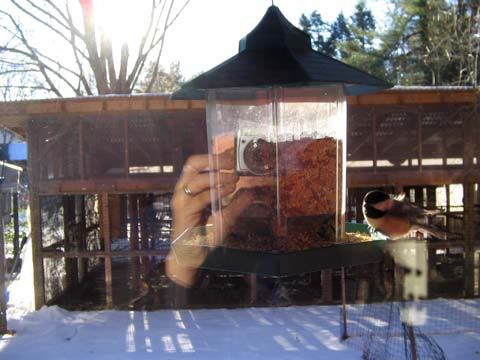365 Urban Species. #007: Black-capped Chickadee

"Self-portrait with Chickadee" Jef Taylor 2006
Urban Species #007: Black-capped Chickadee Poecile atricapilla
Chickadees are small bold songbirds, grouped together with titmice in the family Paridae. Most species in this family are noted for tolerating or even benefitting from the presence of humans. One British species was famed for learning how to remove the cardboard caps from milk bottles, to get at the cream therein. Country folk who make a sport of hand-feeding wild birds find that chickadees are the first to dare to alight on a human fingertip. Chickadees are frequent and welcome guests at birdfeeders, particularly in wintertime. They enjoy fatty treats such as sunflower seeds and suet, which stand in for the insect larvae and pupae that they feed on otherwise.
The black-capped chickadee is the state bird of both Massachusetts (the third most densely populated state) and Maine (among the least densely populated states), which demonstrates that the bird is at home in the deep woods as well as urban areas. The name "chickadee" is an imitation of their buzzy, insistent call: "chick-a-dee-dee-dee." They have a host of other vocalizations, including the haunting two note courtship song, "fee-bee" (though my wife insists that it sounds more like children playing the swimming pool game "Marco Polo"). Their complex social behavior and communication has led to a study, still ongoing, that the researchers hope will "open windows into how the human brain handles language."